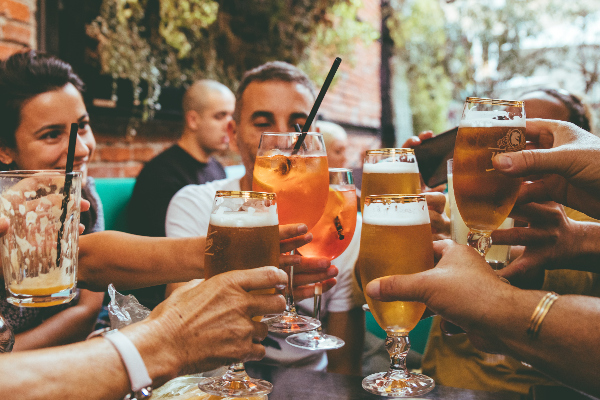It was my second or third day of college, and despite the university’s rules about freshmen not being able to enter Greek property until early January, I found myself walking over to a fraternity house. I remember a nervous energy as I walked up the front steps, mildly aware that I was probably better off getting a good night’s rest before the beginning of classes the next day. But soon enough I was welcomed inside and before long I had a beer (or two) in hand, sitting down on a couch in a room full of strangers. I remember thinking, “well, I guess this is college, right?”
G.K. Chesterton, an English writer, philosopher, and theologian once said, “In Catholicism, the pint, the pipe, and the Cross can all fit together.” Chesterton is quite right: in the Christian life there is room both for the Cross and for enjoying the beauty of the good things that God has given us here on Earth. As Psalm 104 reads, the Lord created, “wine to gladden [our] hearts.” Jesus’ first miracle involved changing water into wine for a wedding feast—a celebration. It’s no wonder alcohol is often consumed under celebratory circumstances, as it can facilitate great community and fellowship. It has a certain way of lightening the mood, bringing folks together, and can even help us let our guard down and get to know each others better.

So, if alcohol is such a gift—if it brings people together—why is drunkenness a sin? As a fraternity brother once asked me, “why drink if not to get drunk?” St. Thomas Aquinas, a proponent of enjoying alcohol, explains that drunkenness is a grave sin because it breaks our relationship with God. When we drink to excess and fall into drunkenness, we don’t have the ability to reason or exercise our free will properly, and so we resort to our passions, which can often be misguided. As a result, we tend to make decisions we might later regret and so shame can take the front seat. Where we might have thriving, joyful community when sharing a few drinks among friends, we can soon stray into dangerous territory when the gift that God has given us in alcohol is taken in excess or abused.
So how do we, then, enjoy alcohol without falling into the sin of drunkenness? God invites us to exercise prudence—the charioteer of all virtues—and temperance when we enjoy any of the great gifts that he’s given us. “A person with moderation controls his desires for pleasure rather than letting these desires master him,” says Steven Jensen, a professor of Thomistic Ethics (Living the Good Life, p. 79). On the college campus this virtue of temperance—or moderating one’s desires for pleasure—is often challenged as the party culture suggests that drunkenness is the only pathway to enjoying alcohol. However, to be truly free to properly enjoy a gift, we ought to have control over our desires.
But what if I’m not falling into drunkenness? What if I’m only enjoying a few beers with friends? Is drunkenness the only way to misuse alcohol? Does it really matter if I or my friends are underage? While I sat there in that fraternity as a freshman, I remember considering the same thing. I was just having a beer or two; I wasn’t getting drunk. So, what was really wrong? I knew my limits. Once again, wasn’t having a beer or two and hanging out with people college in a nutshell?
St. Paul tells us in Romans 17:1, “Let every person be subordinate to the higher authorities, for there is no authority except from God, and those that exist have been established by God.” While this may seem like a radical command, there is a level of obedience that is due to the higher authority to respect the laws of our given society, insofar as they do not violate a moral command from God. By respecting the authority of the land in which we live, we pay honor to Christ and can also adequately prepare ourselves to enjoy the gift—in this case, alcohol—once we can appropriately receive it. In some ways, waiting to enjoy a gift like alcohol by respecting the law can be a great fast and increase our ability to rely on the Lord.
Following my reversion to the faith my freshman year, I tried to abstain from drinking underage to honor this command and to also act as a living witness to the Gospel in the fraternity I ended up rushing. You might ask how it was possible to live a life apart in such an environment, and I won’t lie: it was a challenge. However, my decision to be obedient did open up many fruitful conversations with my fraternity brothers, which eventually allowed me to make invitations to Bible Studies and even opportunities to present the Gospel to them. When you live a life set apart, people notice and can even be attracted to it.

If you are of age, here are a few practical considerations for you to ruminate when it comes to enjoying alcohol:
1. Know your company
Who do you enjoy spending time with? If you often drink together, how does alcohol affect the quality of this time? Is it possible to stick to your limits during your time together? Or does one too easily become too many? Can you have fun with or without alcohol? Even if you are of age, can you make a point of not drinking around those who are underage, especially in settings such as a fraternity party where alcohol consumption isn’t being regulated? By drinking in an environment where underage drinking is permitted and even encouraged, there is potential for scandal. Consider hosting a private party just for those over 21, or find a bar you can go to, with a crowd you know, that makes it easy to enjoy each other’s company fully and appropriately.
2. Know your limit
Let’s face it: some of us can handle a little less (or more) alcohol than others. One simple way of trying to temper your consumption based on your limit is to think ahead to the number (and type) of drinks you will have in a given sitting. The amount you will consume at a longer social gathering might be different from what you would have at a dinner. Furthermore, don’t feel the need to rush, but take the time and enjoy what you’re drinking. If you find yourself struggling to stick to the limits you set for yourself, consider reaching out to others for help. You may find you need to avoid certain situations all together or could use the help of others in a program such as AA.
3. Know your taste
One of the gifts of moderation is that you can learn to enjoy the complexities and flavors of each drink. Learn to drink what you like! Try different types of beer, bourbon, wine, etc. based on your taste. Have a tasting night with friends. Research different types of alcohol and understand the process behind their creation. The more you understand where the gift comes from, the better you can appreciate the gift!
So, if the time is right, “eat your bread with joy and drink your wine with a merry heart, because it is now that God favors your works” (Ecclesiastes 9:7). Let us go forth and enjoy the great gift of alcohol, while also living radical lives as witnesses to Christ.
